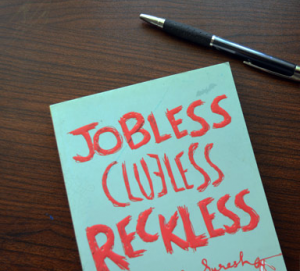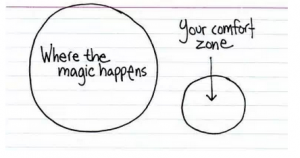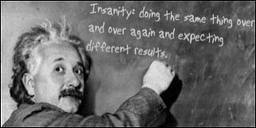At least, these are the questions (and my responses) just sent to me by a journalist who writes for a number of newspapers. This time, he has been contracted by a company that researches – and writes about – the wealthiest families in America.
I’ll let you know if/when/where the interview will be published, in the meantime, here goes:
1) A little personal background information. I understand Adrian J. Cartwood is a nom de plume?
Yes. I share intimate personal details about my financial background. If I used my real name, I’d just be bragging instead of sharing. Seriously, I started off by inheriting a family business that was failing, and I was $30k in debt. By slowly fixing the business (while starting another), living mainly off my wife’s part-time salary, and investing EVERY penny that we could spare into real-estate and stocks, our net worth grew to $7 million in just 7 years.
2) What inspired you to start your blog? (what did you do pre-blog—what do you do now besides)
In 1998, when I was still in debt and my businesses were still struggling, I found what I like to call my Life’s Purpose … or “Life After Work”. Others call this retirement, but who wants to wait until they’re 65 to start living their passion? I decided that I really wanted to be traveling and working on things that I was passionate about in just 5 years instead of the usual 20 to 40 years.
So, I calculated my Number, that is how much I would need in the bank in order to stop working. That Number was a very scary $5 million. I missed my 5 year / $5 million target, but made $7 million in 7 years, instead.
Now, starting $30k behind the 8-ball, $5 million in 5 years seems like an impossible target, so I started reading every single personal finance book that I could get my hands on. What I quickly realized is that they are mostly written by people who became rich BECAUSE they wrote a book about how to get rich. Needless to say they were mostly full of rubbish.
So, I found one of my passions! It was, and remains, to be the first true multi-millionaire to write about personal finance, hence the blog.
In my spare time, I develop property and make angel investments, primarily in internet businesses. I am also putting the finishing touches on my first personal finance book.
3) When did you launch your blog? How many visitors does your blog get?
I don’t do any advertising, marketing, or promotion for my blog at all. I’m not even sure how you found me! Yet, in the three years that I’ve been writing it, I’ve somehow built a dedicated audience in the thousands who seem to read my blog every day. I hope to never disappoint them.
4) For whom is your blog intended?
This is an excellent question because I often get comments from new readers who say “well, my 401k is company matched, so it’s a great investment” but, I say “sure, but it won’t make you rich”. So, my blog is specifically targeted to people exactly like me: those who realize that their life isn’t merely about money … rather their money is simply there to support their life.
Now, for those readers who truly get this, suddenly they realize that that they, too, want to stop full-time work to pursue their passions – be it writing novels, traveling, researching great wines, writing their own blogs, volunteer, whatever. The kicker is, when they calculate their own Numbers – how much they need in passive investments to support them while they work part-time or quit paid work entirely – it’s inevitably something like $2 million in 6 years. If you run their starting position (say $100,000) through any
simple online compound growth rate calculator, as I encourage my readers to do, they quickly see that they need to achieve a 65% compound growth on their investments. Given that their 401k can’t achieve more than 8% over 40 years, it’s clear that they need somebody to teach them how to become rich.
That narrows down my readership to those who have done the same kind of self-reflection that I did 7 years ago and realize that they actually NEED to become rich.
5) What do most hope your readers get out of it?
I hope that my new readers realize that they should evaluate their lives and see if what they are currently doing is going to truly satisfy them. If so, don’t change anything. But, for those who need more out of life, I hope that they walk away with the tools to evaluate what they truly want to do with their lives, how much money they will need (and by when), and the real personal financial steps that they need to take to bridge the gap … quickly. It’s not about getting rich quick. But it is about getting richer, quicker.
6) For those unfamiliar, what would be some representative posts?
I really like this one, because it encourage you to start thinking externally rather than internally, which is the first step to financial freedom:
And, this one because it shows that WHERE you invest your money is more important than HOW MUCH you put aside each week or month:
Finally, this one, because it introduces the 20% Rule that tells you how much you can spend on a house:
7) Did you grow up in a financially literate household? Did your parents discuss money matters with you?
I grew up in a poor household. The rest of my family grew up in a rich one. The trouble was, it was the same house!
You see my father lived beyond his means, but I was the only other male in the family, so he only confided his true financial situation in me. Therefore I grew up paying for all of my own clothes, cars, and so on. The rest of my family still lives on handouts from richer relatives.
That knowledge only taught me financial responsibility, it didn’t teach me how to make money. That came from my $7 million 7 year journey. Naturally, I taught my own children about money from birth. My son is a natural entrepreneur. My daughter more social. But, both know how to save and how to spend responsibly.
8) If not, were you self taught? Were there any books, for example that influenced you? Or financial pundits?
The books that greatly influenced me were Rich Dad, Poor Dad by Robert Kiyosaki and The E-Myth Revisited by Michael Gerber. The first is about money and the second about business.
9) How did you get started in investing?
My very first investment was an apartment that I bought soon after college because a friend of mine was buying one in the same block. I knew nothing other than to copy him. I sold it a couple of years later to pay for a trip overseas. It’s safe to say that was not the start of my financial journey!
When my financial wake-up call arrived 7 years ago, I made my first real real-estate investment. Rich Dad, Poor dad was my motivation, but it was very short on ‘how’. So, like most people, I knew that I had to invest in real-estate but I had no idea HOW.
One day I was driving around my neighborhood and saw a ‘for sale’ sign on a condo in an older block of 12. There was an Auction just about to start! I figured that not many people would know about it, because the sign was by an out-of-town agent, so I figured it was likely to go for a good price, so I stopped to check it out.
My next problem was that I had literally no idea of how much to pay. But, I saw a young guy in a trademan’s outfit measuring doors and windows and so on. I guessed that he was planning to buy it for himself, fix it up and flip it. I decided to bid against him and pay $1 more. I figured that if he was looking to take a quick profit that he would be operating on a tight budget, and that I could then afford to pay just that little bit more to buy and hold.
And, that’s what happened.
I found myself as the winning bidder for a property that I had never been in before. I had to call my wife (who was NOT pleased) to rush over with my checkbook. We still own that condo today and it has been a start performer, although we went on from there over the next 5 years to buy our own block of condos, an office building and so on.
10) What were some of the defining lessons you learned when you first started out?
You can’t save your way to wealth. Running some simple numbers through that online calculator quickly showed me that my 401k would never be able to fund my retirement even if I waited until 65: investment returns from mutual funds are simply too low and fees are too high, not to mention inflation eats up half of everything every 20 years.
I realized that I would need to create my own perpetual money machine by taking as much of income as I could put aside and investing in assets that I could borrow against (so that I could buy more) but had enough income to cover the costs of owning those assets. Real-estate (and, to a lesser extent a small portfolio of hand-picked stocks) could fit the bill. I also learned that starting a business is the best way to increase income; more income means more investments; more investments means more real wealth.
11) What are some of the most common mistakes investors make?
The most common and deadly mistake is confusing good debt and bad debt with cheap debt and expensive debt. Because so many people have trapped themselves into bad credit card debt, which they should pay off as quickly as possible because it’s just so expensive, they have been lead to believe by so many financial pundits that they should pay off all of their debt, including their mortgages. For most people, this is actually a mistake.
Instead they should pay off expensive debt (such as credit cards, and auto loans) as quickly as possible. But, as soon as they remaining loans are at a lower rate than the cost of an investment loan (such as you might get to buy an investment property), why pay it off just to take out a bigger, more expensive investment loan?
The second mistake is thinking that you house is an investment, it’s not. The chances are that you will never be able to sell that house, even when you retire, to truly down-size. Retirees plan on selling their big houses but rarely move into a small, two bedroom condo. They realize that they either don’t want to move, or stay close to their children, or move into an expensive retirement community. That and the moving costs (plus, are you going to move old furniture into a nice, new codo?) mean that they pocket a lot less than they think. Suddenly, there’s a huge hole in their retirement plans.
12) What is the most common question you are asked?
Mostly, people ask me how I became rich. On my blog, I tell them because it’s something that anybody can do.
13) What are some key dos and don’ts you think investors should consider?
I think that you should find out what you’re passionate about e.g. real-estate, stocks, business and learn all you can about that subject then base your investment strategy primarily about that.
I don’t think that you should buy any “how I made $1 million by invest in …” books, instead you should find one author whom you feel speaks your language and learn all you can, then go ahead and try out what you have learned. But, first, you should make sure that the author actually made his/her money from the financial strategies that they speak to you about. You’ll find that most made their money either by writing their books or in the business of offering financial advice, rather than actually from investing.
I think that you should buy a house, but then you should not put more than 20% of your net worth into any subsequent or upsized houses.
I think you should not take on debt for consumer purchases, such as gifts, cars, or furniture but you should borrow reasonable amounts of money to invest (say, 20% down real-estate).
I think you should start a business, but you should not quit your job until you have proven the business model with at least some paying customers
14) The most important question: How much do you miss the Deerfield Bakery?
I still have a home in Deerfield as well as my other home in Australia, so you might say that I am in the fortunate position of being able to have my cake and eat it [pun intended].
 This is quite typical of the types of questions that I receive from time to time:
This is quite typical of the types of questions that I receive from time to time:









